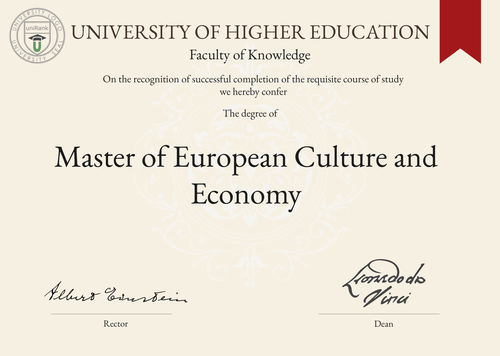
Master of European Culture and Economy (MCE)
Guide to Master of European Culture and Economy Program/Course/Degree
Master of European Culture and Economy (MCE)

Program Name
Master of European Culture and EconomyProgram or Degree abbreviation
MCEDuration range
The duration of the program typically ranges from 1 to 2 years, depending on the university and country.Tuition range
Tuition fees for the Master of European Culture and Economy program vary depending on the chosen university and country. It is recommended to check with specific institutions for accurate information.Overview
The Master of European Culture and Economy program is designed to provide students with a comprehensive understanding of the cultural, economic and political aspects of Europe. It offers a multidisciplinary approach, combining courses in European studies, economics, cultural studies and international relations.Curriculum Overview by year
The curriculum of the Master of European Culture and Economy program is structured to provide students with a broad knowledge base and specialized skills. The specific courses and their order may vary depending on the university, but typically cover topics such as European history, European integration, cultural diversity, economic policies and global markets.Key Components
The key components of the Master of European Culture and Economy program include: - In-depth study of European culture, history and diversity - Analysis of European economic policies and their impact on the region - Understanding the process of European integration and its challenges - Development of critical thinking and analytical skills - Research and writing skills for academic and professional purposes - Opportunities for internships or study abroad experiencesCareer Prospects
Graduates of the Master of European Culture and Economy program can pursue various career paths. Some potential career prospects include: - European Union institutions and agencies - International organizations and NGOs - Cultural and heritage organizations - Economic research and consulting firms - Government agencies and ministries - Academic and research institutionsSalary Expectations
Salary expectations for graduates of the Master of European Culture and Economy program can vary depending on factors such as job position, location and level of experience. It is recommended to research specific industries and job markets for accurate salary information. For a more accurate understanding of salary expectations, you can utilize the Job Sites Search Engine, from our sister site jobRank, which searches over 4,600 job sites worldwide. Make sure to specify not only the job title but also the country you are interested in.Conclusions:
In conclusion, the Master of European Culture and Economy program offers a comprehensive understanding of Europe's cultural and economic dynamics. It equips students with valuable skills and knowledge for various career paths. However, it is important to note that program duration, tuition fees, curriculum, key components, career prospects and salary expectations can vary depending on the chosen country or location of study, as well as the university. Visitors interested in pursuing this degree are encouraged to use the uniRank World Universities Search Engine to find institutions offering the Master of European Culture and Economy program worldwide.World Universities Search Engine
search for Master of European Culture and Economy (MCE) and add the Location (country, state etc.) or specific University you are interested in studying at.
Query examples:
- Master of European Culture and Economy (MCE) United States
- Master of European Culture and Economy (MCE) United Kingdom online
- Master of European Culture and Economy (MCE) Australia international students
- Master of European Culture and Economy (MCE) University of California
- Master of European Culture and Economy (MCE) University of London tuition fees
- Master of European Culture and Economy (MCE) University of Sydney scholarships
Share Program/Course
Interesting? Share this program/course/degree info with your friends now.